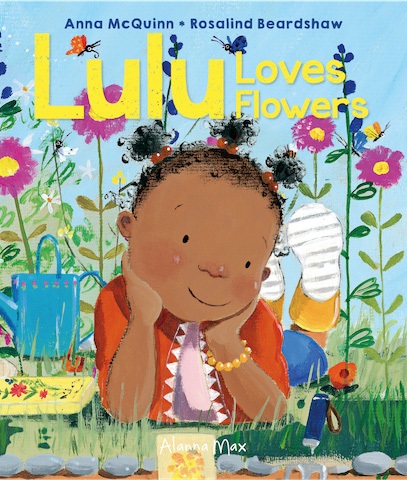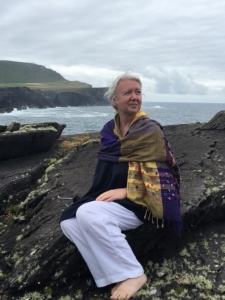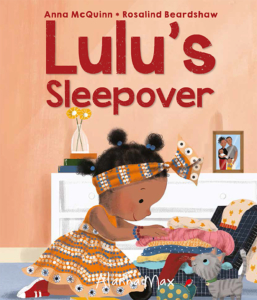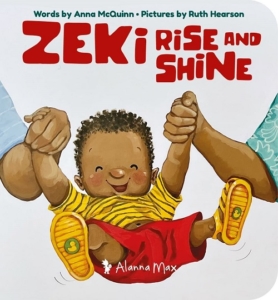
This article is in the Publishing Profiles Category
Lulu and Zeki and Anna McQuinn
Booky Girl Lulu and Zeki Books are two high-quality picture book series totally in tune with how young children view the world. Conceived by award-winning publisher and author Anna McQuinn, each carefully crafted book joyfully reflects the everyday routines and mini adventures of babies and pre-schoolers as book-loving Lulu and her baby brother Zeki become intrepid little explorers supported by their loving parents.
Published in the UK and Ireland by Alanna Max, both series are also hugely successful worldwide. And with a 10-book US publishing contract just secured, there’s an exciting future ahead for these empowering, inclusive stories.
 As a former teacher, Sure Start community librarian and publisher, author Anna McQuinn is a multi-talented yet unassuming giant in children’s publishing who has written over 30 works for children. Fabia Turner interviewed Anna for Books for Keeps.
As a former teacher, Sure Start community librarian and publisher, author Anna McQuinn is a multi-talented yet unassuming giant in children’s publishing who has written over 30 works for children. Fabia Turner interviewed Anna for Books for Keeps.
You started writing the Lulu series while working, part-time, as a community librarian. Did this experience inform your writing in any way?
Yes, it did. I was delighted with the opportunity to work directly with young children and their families. It was challenging but I really loved it. Using books with children every day, I learned a lot.
For me, stories need to take children and their concerns seriously. The things this age group are concerned about may seem small or inconsequential to adults – but I believe they are worthy of respect and serious consideration. The resulting stories may appear simple, but there’s often a lot going on under the surface.
When I submitted the first Lulu story to publishers, I was repeatedly told that it didn’t have enough going on—’too slight’ was the phrase I remember. That was hard to hear, but after working closely with young children for two years, I had the confidence not to give up. I took the story to the Bologna Book Fair and I sold the US & Canadian, Dutch and Danish rights.
Recently I was really gratified when Charlotte Hacking of CLPE put me in the amazing company of Ken Wilson-Max, Chris Haughton, Daisy  Hirst, and Petr Horáček, describing us as, ‘Some of the very best writers for the youngest children.’ So I am enormously grateful for what ended up being twelve years at Sure Start. I don’t think I would be the writer I am without it.
Hirst, and Petr Horáček, describing us as, ‘Some of the very best writers for the youngest children.’ So I am enormously grateful for what ended up being twelve years at Sure Start. I don’t think I would be the writer I am without it.
Lulu and Zeki’s family is depicted in a naturally inclusive and authentic way. The books also gently address class, economic status, gender roles and same-sex relationships. Can you tell us how you achieve this?
I often struggle to explain how I approach this. Rumaan Alam in his extraordinary article, We need more diverse books like The Snowy Day, sums it up in ways I never could. Alam says,
‘Peter is a gift to readers like my sons because what’s never in question is that he is the everyman—an everyboy—and that he is black. That this is so rare is maddening. We need more books in which our kids are simply themselves, and in which that is enough’.
In Lulu I wanted to create an ‘everychild’—a little Black girl with real agency, who is the hero of the story for no reason at all. I wanted to take all of her ‘small concerns’ seriously – her love of books, her ambition to have a garden, or get a pet cat, her preparations for starting preschool or going on her first sleepover…
In wanting to create an ‘everychild’, I knew I would have to work hard so more children would see themselves in Lulu. That meant being sensitive to things that might exclude and looking all the time to create opportunities to include instead. That often comes down to small careful details.
For example, early on, I decided to locate Lulu’s family in an upper-floor flat. It’s not an ‘issue’—millions of kids thrive living in flats—but it does mean I have to think about how that impacts on every story I write.
So, when I researched Lulu Gets a Cat, all the online advice was to put a new kitten or cat in ‘your utility or spare room’ until they settle. Lulu’s family doesn’t have a utility, so I contacted Cats Protection. They advised that a small, contained space would do the job perfectly well. So, that’s what I did. It’s a tiny detail, likely unnoticed by children who live in houses with spare rooms, but it includes all those children who don’t.
You work hard to be inclusive in your own writing. Are you involved in other projects that aim to increase diversity in publishing generally?
Yes, I started waaay back in the 1990s when I was very involved with the Working Group Against Racism in Children’s Resources. More recently I’ve mentored people via Creative Access, and informally I work with a few authors and two small publishers in the UK and Ghana. I’m a mentor for the Jericho Prize – I think it’s fantastic not just in giving a prize but in offering free workshops, panel sessions and advice to aspiring writers – that’s hugely important in opening doors.
The illustrations are exquisite thanks to the genius of Ruth Hearson and Rosalind Beardshaw. There is an effortless synergy between your words and their artwork. As an author who’s also an experienced editor, how involved are you in the illustrative process?
Many of my favourite books are by author-illustrators (Ken Wilson-Max, Suzanne Bloom, Kevin Henkes, Shirley Hughes, Ezra Jack Keats, Sandra Boynton…) so when I worked as an editor and publisher, I tried to create books where text and illustrations were interwoven as if one person produced them.
It’s really unusual for authors to be involved in the illustration process, but because of how Lulu started (with me effectively acting as a publisher) I’ve ended up commissioning the art.
I have to be REALLY self-disciplined and not ask the illustrators to draw what’s in my head. I leave as much as possible up to them. I usually send them draft text which, although rough, is often actually closer to what I want to say. Then, when the illustrations come in, so much of what I want to communicate is in the art that I can strip away unnecessary text. It’s a much easier time to kill your darlings!
Over time, the illustrators have developed their own strong sense of the characters so the synergy between words and illustrations has grown. I feel extraordinarily blessed to work with two such talented women.
The latest titles, Zeki Rise and Shine and Zeki Sleep Tight, feel even more lyrical than previous books. Was this a conscious shift?
 Gosh, that’s a good question. I think that I try to respond to whatever topic I’m writing about. The first three Zeki stories were quite matter-of-fact, so the language is appropriately simple. When the publishers asked if I would do Zeki Loves Mummy and Zeki Loves Daddy, I responded with more playful and rhyming text.
Gosh, that’s a good question. I think that I try to respond to whatever topic I’m writing about. The first three Zeki stories were quite matter-of-fact, so the language is appropriately simple. When the publishers asked if I would do Zeki Loves Mummy and Zeki Loves Daddy, I responded with more playful and rhyming text.
When they asked for a good morning and goodnight pair I was thrown, not knowing how I would do anything different or original. Then I came up with the idea of the senses waking up/going to sleep one by one, and that got me going. I LOVE alliteration, consonance and assonance, so I went wild!
I was also thinking about the parent reading so Zeki Rise and Shine is full of vibrant words that are fun to say, but Zeki Sleep Tight is slower—and the sentences get longer as you go along, to force the reader to linger on the page and slow down,
‘He soaks in smells of forests where all the owls are sleeping’.
I did have to fight to keep that one, but I’m really proud of how well it sounds.
We’re already at work on the next pair (Zeki Goes to the Park and Zeki Hikes with Daddy). There’s a lot of play with hot and cold contrasts and different textures, so the texts are less lyrical but they work with the subject matter.
It sounds like the future is bright for Lulu and Zeki?
It’s amazing! My publishers in the UK and the US have believed in Lulu and Zeki from day one, so I’m absolutely thrilled that they feel confident enough to sign up in advance for 10 new books. It’s very exciting! And hectic—it’s a lot of writing!
Fabia Turner is a former teacher and an educational book editor. She runs the Candid Cocoa book blog and created the Black Children’s Books Directory. She is founder of the Jericho Prize for Children’s Writing.
The Booky Girl Lulu by Anna McQuinn illustrated by Rosalind Beardshaw and Zeki Books by Anna McQuinn and Ruth Hearson are published by Alanna Max.





